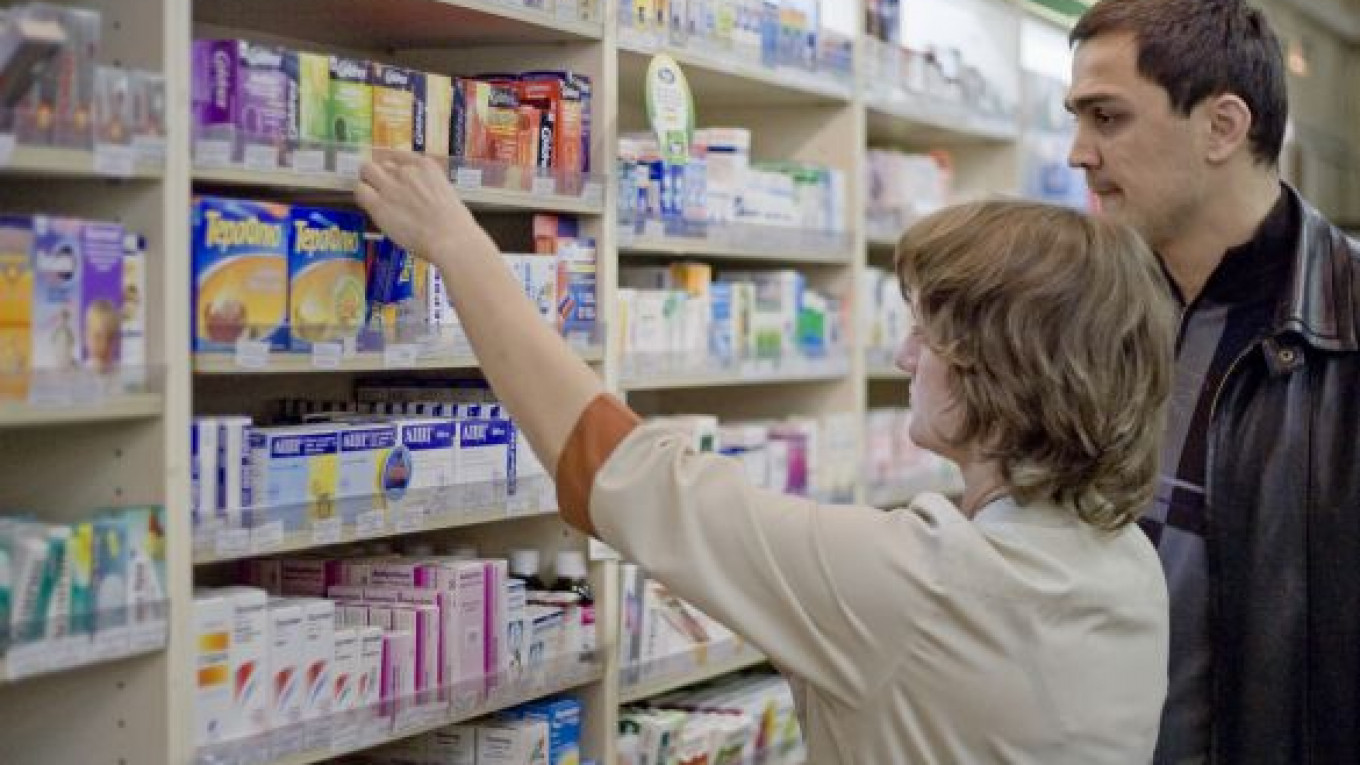Two foreign drugmakers signed tentative agreements with domestic companies on Tuesday, which will facilitate development of biotechnologies on the local pharmaceutical market.
Belgian company UCB Pharma signed a memorandum of understanding with biotech local partner Binnofarm, which will result in the foreign drugmaker eventually localizing production, in line with the government's strategy to develop the pharmaceutical industry over the next 10 years.
Under the agreement, Binnofarm will package some of UCB Pharma's drugs for supply to the local market, and the Belgian firm hopes to subsequently manufacture part of its medications at Binnofarm facilities.
The Belgian company, which is one of the world's biggest manufacturers of drugs for epilepsy, also plans to transfer its technologies to Binnofarm.
"UCB Pharma intends to strengthen Russia's participation in international clinical trials and concentrate on solving patient's problems," the company said in a statement.
UCB Pharma's chief executive Roch Doliveux said, however, that the company had no intention to build its own local facilities, in light of the specifics of biopharmaceutical manufacturing and Russia's intellectual capital.
"The policy should be much more stimulating research than stimulating manufacturing," he told reporters at a news conference. Promoting research is the right way to develop the local biotech industry, he said.
Doliveux said the company plans to conduct joint research with Russian universities and companies.
Prime Minister Vladimir Putin pushed for developing the domestic biotech market in order to bring up its worldwide market share from 0.2 percent to 5 percent in the next 10 years.
Thierry Teil, UCB Pharma's managing director for Russia, said the drugmaker hoped for "a long-term strategic partnership."
"We are not manufacturing anything in Russia, not even packaging. So it will be a new thing for us," Teil said.
The company approached other domestic drugmakers, like London-listed Pharmstandard, for cooperation, but settled on Binnofarm — owned by Sistema — as "an ideal partner." Teil said cooperation with more companies is still possible.
Sistema invested more than 4.3 billion rubles ($152 million) in Binnofarm production facilities, which were launched in 2009, according to the drugmaker's web site.
UCB Pharma wouldn't elaborate on the volume of investment in the joint project, saying only that it expects to triple its local sales in the next nine years.
The drugmaker's domestic sales stood at 60 million euros last year ($84 million), UCB Pharma said in the statement citing research company IMS.
With 0.5 percent of the local pharmaceutical market, UCB Pharma is largely focusing on medications for allergy and cardiovascular diseases, but plans to expand its product portfolio and start selling additional drugs by the end of this year.
On Tuesday, British-Swedish drugmaker AstraZeneca signed a memorandum of understanding with Russian Venture Company — the state firm that organizes investment capital for innovative projects — after breaking ground on its new $150 million Kaluga-based plant.
AstraZeneca joins the list of foreign drugmakers — including Swiss company Nycomed and French firm Sanofi-Aventis — that already set up manufacturing or are building local production facilities.
The company — which annually spends about $4 billion on research and development — is ready to provide financial support to successful projects by domestic companies, transfer technologies and bring its specialists to Russia, said Nenad Pavletic, president of AstraZeneca Russia.
AstraZeneca, which signed a tentative agreement with Skolkovo Foundation in February, plans to use that partnership to look for potential biotech, Pavletic said at a round table on international cooperation in the pharmaceutical industry that took place in Moscow on Tuesday.
Russian Venture Company chief executive Igor Agamirzyan said his firm would also facilitate funding such projects.
More than a half of the money invested through Russia Venture Company last year went to developing the domestic pharmaceutical sector, Agamirzyan said.
Such investments totaled 1.4 billion rubles in 2010, according to Russian Venture Company's web site.
Editor's Note: An earlier version of this article incorrectly referred to AstraZeneca as a British-Swiss company. It is actually a British-Swedish company.
A Message from The Moscow Times:
Dear readers,
We are facing unprecedented challenges. Russia's Prosecutor General's Office has designated The Moscow Times as an "undesirable" organization, criminalizing our work and putting our staff at risk of prosecution. This follows our earlier unjust labeling as a "foreign agent."
These actions are direct attempts to silence independent journalism in Russia. The authorities claim our work "discredits the decisions of the Russian leadership." We see things differently: we strive to provide accurate, unbiased reporting on Russia.
We, the journalists of The Moscow Times, refuse to be silenced. But to continue our work, we need your help.
Your support, no matter how small, makes a world of difference. If you can, please support us monthly starting from just $2. It's quick to set up, and every contribution makes a significant impact.
By supporting The Moscow Times, you're defending open, independent journalism in the face of repression. Thank you for standing with us.
Remind me later.






